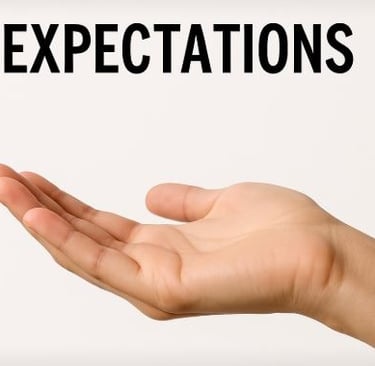Expectations Or Acceptance
Which will you choose
CULTURE&LIFE


You’ve probably heard the phrase “expectation is the root of all heartache.” It sounds dramatic, but there’s a quiet truth tucked in there. When we expect things to go a certain way—whether it’s how others should treat us, how our careers should unfold, or how life should reward our efforts—we unknowingly set ourselves up for disquiet. Because let’s be real: life rarely shows up the way we imagined.
That’s where acceptance comes in. Acceptance isn’t about giving up or being passive. It’s about seeing life for what it is—without the emotional baggage of “this should have happened instead.”
Social expectations are like emotional IOUs we don’t even realize we’re handing out. We care about someone, we show up for them, and naturally, we expect they’ll do the same. It’s human. And honestly? Reasonable.
"Here’s the catch: people see the world through their own eyes and mind, not ours", they don't always see things the way we do—Everyone’s dealing with their own stuff.
They’ve got their own priorities, wounds, blind spots, and limitations. What feels like a basic expectation to us might feel like a huge emotional stretch for them—or worse, something they don’t even notice.
Let’s say you’ve been there for a friend through their messiest times. Listened, supported, cancelled your own plans to be there. And now, when you need a sliver of that support back? They disappeared. Or send a generic “take care” text.
You feel let down. Naturally. Maybe even hurt or angry.
But this is where acceptance comes to the rescue.
You ask yourself:
“What was I hoping they’d do?”
“Why does their behavior hurt so much?”
“Is it possible they’re just not capable of giving what I expected?”
Because sometimes, people do care—just not in the way you need. Or they don’t know how. Or they’re too caught up in their own mess. It sucks—but it’s true.
Anjali’s Social Wake-Up Call
Anjali was the go-to friend in her circle. Birthday surprises? She planned them. Breakups? She brought ice cream and wisdom. Hospital visits, late-night calls—you name it, she showed up.
Then, her father fell seriously ill. She was overwhelmed, emotionally wrecked. And suddenly, that friend circle? Became very quiet. Other than a couple of “thinking of you” messages, no one really stepped in—not like she had for them.
She was shattered. “How could they not be there for me? After everything I’ve done?”
But after the storm settled, she started seeing things differently. Her “giving” had come with a silent contract: If I give this to you, you’ll give it back.
And they had never signed it.
She didn’t become cold or withdrawn. But she got wiser. She recalibrated her expectations. She stopped overextending herself. She began investing in the few people who truly saw and supported her—and let go of the rest, without bitterness.
The key takeaway?
Expectation says: “You owe me what I gave you.”
Acceptance says: “You gave what you could. I hoped for more—but now I know.”
That’s not to say people shouldn’t give back. They should. Come on—it’s the humane thing to do. Be aware, be considerate. Know when to step in, and when to step back.
But in social situations, minimizing expectations isn’t about becoming emotionally numb. It’s about emotional clarity. We love people, care for them, and hope they’ll do the same—but we stop taking it personally when they fall short.
That’s when peace moves in. That’s when life starts to feel lighter, calmer, and a little more free.
Have you been in a situation like that with someone close? How did you handle it?
